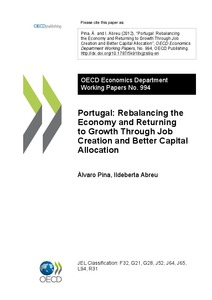Portugal: rebalancing the economy and returning to growth though job creation and better capital allocation
"Low growth and huge current account deficits have characterised the Portuguese economy over the past decade. Easy credit in global markets, combined with the absence of incentives to limit loan-to-deposit ratios until recently, made it possible to finance internationally high levels of consump...
| Main Authors: | , |
|---|---|
| Institution: | ETUI-European Trade Union Institute |
| Format: | TEXT |
| Language: | English |
| Published: |
Paris
2012
OECD |
| Subjects: | |
| Online Access: | https://www.labourline.org/KENTIKA-19120151124919483339-Portugal-rebalancing-the-econo.htm |
| _version_ | 1771659901686251521 |
|---|---|
| author | Pina, Alvaro Abreu, Ildeberta |
| author_facet | Pina, Alvaro Abreu, Ildeberta |
| collection | Library items |
| description | "Low growth and huge current account deficits have characterised the Portuguese economy over the past decade. Easy credit in global markets, combined with the absence of incentives to limit loan-to-deposit ratios until recently, made it possible to finance internationally high levels of consumption and investment relative to gross domestic product (GDP) through over reliance of the banking sector on wholesale funding. This led to high households’ and firms’ indebtedness and made banks vulnerable to shifts in investor sentiment. However, investment and credit were mostly directed to sheltered sectors, giving rise to an oversized road infrastructure, electricity generation capacity and housing stock. Weaknesses in labour market institutions further held back productivity and hampered wage adjustment, making it harder to gain cost competitiveness. The deleveraging process set in motion by the loss of access to foreign financing is helping to rapidly reduce external deficits, but also has the potential to generate a damaging credit contraction, which enhances the importance of alternative financing strategies for firms, such as greater reliance on equity. To restore growth, Portugal needs to foster the reallocation of both labour and capital, essentially towards the tradable sector. Building on recent policy initiatives or commitments, this will require reforming public policies that have long distorted investment allocation, ensuring that banks adequately recognise and provision problematic loans and, on the employment front, reducing labour market segmentation and increasing targeted training. Reforms in wage setting, labour taxation, unemployment benefits and activation policies will foster job creation, thus enhancing output growth while avoiding high unemployment becoming entrenched and threatening social cohesion. This Working Paper relates to the 2012 OECD Economic Survey of Portugal (www.oecd.org/eco/surveys/portugal)." |
| format | TEXT |
| geographic | Portugal |
| id | 19120151124919483339_b2fabfb2188e483ab90f172a5af7d569 |
| institution | ETUI-European Trade Union Institute |
| is_hierarchy_id | 19120151124919483339_b2fabfb2188e483ab90f172a5af7d569 |
| is_hierarchy_title | Portugal: rebalancing the economy and returning to growth though job creation and better capital allocation |
| language | English |
| physical | 35 p. Digital |
| publishDate | 2012 |
| publisher | Paris OECD |
| spellingShingle | Pina, Alvaro Abreu, Ildeberta activation economic growth employment creation regulation wage policy financial system Portugal: rebalancing the economy and returning to growth though job creation and better capital allocation |
| thumbnail | https://www.labourline.org/Image_prev.jpg?Archive=111229193940 |
| title | Portugal: rebalancing the economy and returning to growth though job creation and better capital allocation |
| topic | activation economic growth employment creation regulation wage policy financial system |
| url | https://www.labourline.org/KENTIKA-19120151124919483339-Portugal-rebalancing-the-econo.htm |

